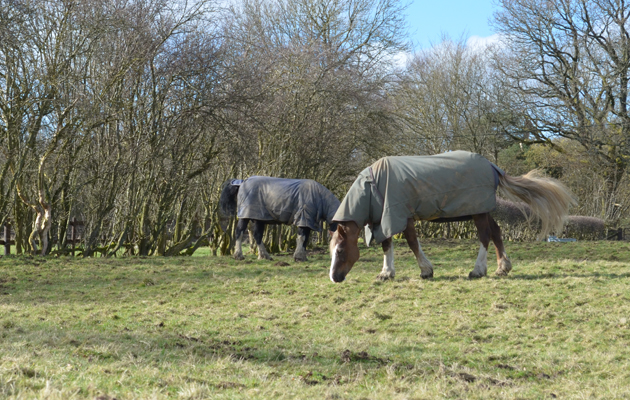The study indicated that welfare issues concerning emotional state or behaviour are at risk of being omitted from end-of-life decisions. H&H speaks to researchers and welfare experts to find out more
RESEARCH has suggested the need for more conversations around equine euthanasia as a new study shows owners are not considering horses’ emotional or behavioural issues as much as they should.
The preliminary study, Attitudes of the equestrian public towards equine end of life decisions, by equine behaviourists Catherine Bell and Suzanne Rogers of the Equine Behaviour Training Association, published this month in Animals, aimed to understand what factors owners consider when making the decision to put a horse down.
{"content":"PHA+VGhlIHN1cnZleSwgd2hpY2ggd2FzIGNvbXBsZXRlZCBieSAxNjAgcGVvcGxlLCBjb250YWluZWQgMzAgc2NlbmFyaW9zIGJhc2VkIG9uIHRoZSDigJxmaXZlIGZyZWVkb21z4oCdIOKAkyBhIDxhIGhyZWY9Imh0dHBzOi8vd3d3LmhvcnNlYW5kaG91bmQuY28udWsvdGFnL2hvcnNlLXdlbGZhcmUiPndlbGZhcmU8L2E+IGZyYW1ld29yayB0aGF0IGNvbnNpZGVycyBodW5nZXIsIGRpc2NvbWZvcnQsIHBhaW4sIGFiaWxpdHkgdG8gZXhwcmVzcyBub3JtYWwgYmVoYXZpb3VyIGFuZCBmZWFyLCBhbmQgY2FuIGJlIHVzZWQgdG8gaW5mb3JtIGVuZC1vZi1saWZlIGRlY2lzaW9ucy48L3A+CjxwPlJlc3VsdHMgc2hvd2VkIHBhcnRpY2lwYW50cyB3ZXJlIG1vc3QgbGlrZWx5IHRvIGNvbnNpZGVyIGV1dGhhbmFzaWEgZm9yIHBoeXNpY2FsIGlzc3VlcyBzdWNoIGFzIGxhbWVuZXNzLCBhbmQgb25seSBhIHNtYWxsIG51bWJlciBvZiByZXNwb25zZXMgaW5jbHVkZWQgY29uc2lkZXJhdGlvbiBvZiBldGhvbG9naWNhbCBvciBtZW50YWwgaGVhbHRoIGZhY3RvcnMgc3VjaCBhcyBkZXByZXNzaW9uIG9yIHN0cmVzcyBmb2xsb3dpbmcgdGhlIGxvc3Mgb2YgYSBjb21wYW5pb24sIHN1Z2dlc3Rpbmcgd2VsZmFyZSBpc3N1ZXMgY29uY2VybmluZyBlbW90aW9uYWwgc3RhdGUgb3IgYmVoYXZpb3VyIGFyZSBhdCByaXNrIG9mIGJlaW5nIG9taXR0ZWQgZnJvbSBlbmQtb2YtbGlmZSBkZWNpc2lvbnMuPC9wPgo8cD5EciBCZWxsIHRvbGQgPGVtPkgmYW1wO0g8L2VtPiB0aGUgcmVzdWx0cyBkaWQgbm90IHN1cnByaXNlIGhlciBidXQgYWRkZWQgdGhhdCBpdCBpcyBjb25jZXJuaW5nIGlmIG93bmVycyBhcmUgbm90IGZhY3RvcmluZyBpbiBlbW90aW9uYWwgaXNzdWVzIGF0IGFsbC48L3A+CjxwPjxkaXYgY2xhc3M9ImFkLWNvbnRhaW5lciBhZC1jb250YWluZXItLW1vYmlsZSI+PGRpdiBpZD0icG9zdC1pbmxpbmUtMiIgY2xhc3M9ImlwYy1hZHZlcnQiPjwvZGl2PjwvZGl2PjxzZWN0aW9uIGlkPSJlbWJlZF9jb2RlLTMxIiBjbGFzcz0iaGlkZGVuLW1kIGhpZGRlbi1sZyBzLWNvbnRhaW5lciBzdGlja3ktYW5jaG9yIGhpZGUtd2lkZ2V0LXRpdGxlIHdpZGdldF9lbWJlZF9jb2RlIHByZW1pdW1faW5saW5lXzIiPjxzZWN0aW9uIGNsYXNzPSJzLWNvbnRhaW5lciBsaXN0aW5nLS1zaW5nbGUgbGlzdGluZy0tc2luZ2xlLXNoYXJldGhyb3VnaCBpbWFnZS1hc3BlY3QtbGFuZHNjYXBlIGRlZmF1bHQgc2hhcmV0aHJvdWdoLWFkIHNoYXJldGhyb3VnaC1hZC1oaWRkZW4iPg0KICA8ZGl2IGNsYXNzPSJzLWNvbnRhaW5lcl9faW5uZXIiPg0KICAgIDx1bD4NCiAgICAgIDxsaSBpZD0ibmF0aXZlLWNvbnRlbnQtbW9iaWxlIiBjbGFzcz0ibGlzdGluZy1pdGVtIj4NCiAgICAgIDwvbGk+DQogICAgPC91bD4NCiAgPC9kaXY+DQo8L3NlY3Rpb24+PC9zZWN0aW9uPjwvcD4KPHA+4oCcV2XigJlyZSBub3Qgc3VnZ2VzdGluZyB0aGUgbWludXRlIHlvdXIgaG9yc2UgbG9va3MgYSBiaXQgbWlzZXJhYmxlIHlvdSBzaG91bGQgYmUgcHV0dGluZyBoaW0gb3IgaGVyIGRvd24gYnV0IGF0IHRoZSBzYW1lIHRpbWUgaWYgeW91ciBob3JzZSBoYXMgbG9va2VkIG1pc2VyYWJsZSBmb3IgYSBsb25nIHRpbWUsIGV2ZW4gaWYgdGhlcmUgaXMgbm8gcGh5c2ljYWwgcmVhc29uLCB0aGlzIGlzIHNvbWV0aGluZyB0aGF0IHNob3VsZCBiZSBsb29rZWQgYXQs4oCdIHNoZSBzYWlkLjwvcD4KPHA+4oCcQW4gYXdmdWwgbG90IG9mIGhvcnNlcyBhcmUgaW4gdGhlc2UgY2hyb25pYyBsb3ctbGV2ZWwgd2VsZmFyZSBzaXR1YXRpb25zLCB3aGVyZSBldXRoYW5hc2lhIGlzIG5vdCB0aGUgb2J2aW91cyBkZWNpc2lvbiBidXQgaXQgcHJvYmFibHkgc2hvdWxkIGJlIGNvbnNpZGVyZWQsIGV2ZW4gaWYgaXQmIzgyMTc7cyBub3QgbmVjZXNzYXJpbHkgY2FycmllZCBvdXQsIGJlY2F1c2UgYW4gYWx0ZXJuYXRpdmUgc29sdXRpb24gY2FuIGJlIGZvdW5kLuKAnTwvcD4KPHA+RHIgQmVsbCBzYWlkIHNoZSBiZWxpZXZlcyB0aGUgdG9waWMgb2YgZXV0aGFuYXNpYSBzaG91bGQgYmUgZGlzY3Vzc2VkIG1vcmUuPC9wPgo8ZGl2IGNsYXNzPSJhZC1jb250YWluZXIgYWQtY29udGFpbmVyLS1tb2JpbGUiPjxkaXYgaWQ9InBvc3QtaW5saW5lLTMiIGNsYXNzPSJpcGMtYWR2ZXJ0Ij48L2Rpdj48L2Rpdj4KPHA+4oCcV2UgcHV0IHRoZSByZXN1bHRzIG9uIHNvY2lhbCBtZWRpYSBhbmQgcmVjZWl2ZWQgY29tbWVudHMgZnJvbSBvd25lcnMgd2hvIGhhZCBwdXQgZG93biBob3JzZXMgd2l0aG91dCBhbiBvYnZpb3VzIHBoeXNpY2FsIGlzc3VlLCBhbmQgZXhwZXJpZW5jZWQgbmVnYXRpdml0eSBmcm9tIHBlb3BsZSBwZXJjZWl2aW5nIHRoZW0gdG8gaGF2ZSBwdXQgZG93biBhIGhlYWx0aHkgaG9yc2UuIEJ1dCBhY3R1YWxseSBpdCB3YXMgYW4gdW5oYXBweSBob3JzZSB3aXRoIGEgcG9vciBxdWFsaXR5IG9mIGxpZmUgYW5kIHRoYXTigJlzIHdoYXQgcGVvcGxlIHNob3VsZCBiZSB0aGlua2luZyBhYm91dCzigJ0gc2hlIHNhaWQuIOKAnEl04oCZcyBub3QgYWx3YXlzIGEgY2F0YXN0cm9waGljIHBoeXNpY2FsIGZhY3RvciB0aGF0IG1ha2VzIHRoZSBkZWNpc2lvbiBvYnZpb3VzLuKAnTwvcD4KPHA+U29jaWFsIHNjaWVudGlzdCBUYW16aW4gRnVydGFkbywgd2hvc2Ugd29yayBpbmNsdWRlcyBsb29raW5nIGF0IGhvcnNlLWh1bWFuIHJlbGF0aW9uc2hpcHMgYW5kIGh1bWFuIGJlaGF2aW91ciBjaGFuZ2UsIHRvbGQgPGVtPkgmYW1wO0g8L2VtPiBpdCBpcyBpbnRlcmVzdGluZyB0aGF0IG93bmVycyBmb2N1cyBvbiBob3JzZXMg4oCZIHBoeXNpY2FsIG92ZXIgbWVudGFsIGhlYWx0aCwgYnV0IGFncmVlZCB0aGlzIHdhcyBub3Qgc3VycHJpc2luZy48L3A+CjxkaXYgY2xhc3M9ImFkLWNvbnRhaW5lciBhZC1jb250YWluZXItLW1vYmlsZSI+PGRpdiBpZD0icG9zdC1pbmxpbmUtNCIgY2xhc3M9ImlwYy1hZHZlcnQiPjwvZGl2PjwvZGl2Pgo8cD7igJxXZSBkbyBjb25zaXN0ZW50bHkgZmluZCB0aGF0LOKAnSBzaGUgc2FpZC4g4oCcSSBndWVzcyBwYXJ0bHkgaXQmIzgyMTc7cyBhIGJpdCBtb3JlIHRhbmdpYmxlIHRvIHNheSBhIGhvcnNlIGlzIGZpdmUgdGVudGhzIGxhbWUgdGhhbiBzYXlpbmcgYSBob3JzZSBpcyBmaXZlIHRlbnRocyBkZXByZXNzZWQuIEJ1dCBhbHNvIGEgaG9yc2UgbWlnaHQgYmUgZGVwcmVzc2VkIGJlY2F1c2Ugb2YgaXRzIHBoeXNpY2FsIGhlYWx0aCwgc28gb2Z0ZW4gaXQmIzgyMTc7cyBoYXJkIHRvIGV4dHJpY2F0ZSDigJhpcyB0aGUgaG9yc2UgaW4gcGFpbiwgb3IgZGVwcmVzc2VkLCBvciBhcmUgdGhlc2UgYWdlLXJlbGF0ZWQgY2hhbmdlcz\/igJnigJ08L3A+CjxwPlJlc2VhcmNoIGhhcyBzaG93biB0aGF0IGRlbGF5ZWQgZXV0aGFuc2lhIHJlbWFpbnMgb25lIG9mIHRoZSBiaWdnZXN0IHdlbGZhcmUgY29uY2VybnMgYWZmZWN0aW5nIGhvcnNlcyBpbiB0aGUgVUsgYW5kIERyIEZ1cnRhZG8gc2FpZCB0aGUg4oCca2V54oCdIGlzIHRvIGxvb2sgYXQgaG93IG93bmVycyBjYW4gYmUgaGVscGVkIHRvIG1ha2UgZGVjaXNpb25zLjwvcD4KPGRpdiBjbGFzcz0iYWQtY29udGFpbmVyIGFkLWNvbnRhaW5lci0tbW9iaWxlIj48ZGl2IGlkPSJwb3N0LWlubGluZS01IiBjbGFzcz0iaXBjLWFkdmVydCI+PC9kaXY+PC9kaXY+CjxwPuKAnEV2ZXJ5IGhvcnNlIGlzIGFuIGluZGl2aWR1YWwgc28geW91IGNhbiBuZXZlciBoYXZlIGEgc2NhbGUgdGhhdCB3aWxsIHdvcmsgaW4gZXZlcnkgc2l0dWF0aW9uLiBJdOKAmXMgdGhlIG1vc3QgZGlmZmljdWx0IGRlY2lzaW9uIHdlIGhhdmUgdG8gbWFrZSBhcyBvd25lcnMgc28gd2UgbmVlZCB0byBsb29rIGF0IGhvdyB3ZSBjYW4gaGVscCBwZW9wbGUgdG8gZG8gdGhhdCBpbiBhIHdheSB0aGF0IGlzIHJlc3BlY3RmdWwgb2YgdGhlaXIgaW5kaXZpZHVhbCBob3JzZSBhbmQgZ2l2ZXMgdGhlbSBvYmplY3Rpdml0eSzigJ0gc2hlIHNhaWQuPC9wPgo8cD7igJxFdXRoYW5hc2lhIGlzIHRoYXQgZGlmZmljdWx0IHRoaW5nIHRoYXQgbm8gb25lIHdhbnRzIHRvIHRoaW5rIGFib3V0IGl0IGluIGFkdmFuY2UuIEV2ZW4gd2hlbiBpdCBjb21lcyB0byBzdXJ2ZXlzIG9uIHRoZSB0b3BpYywgcGVvcGxlIG9mdGVuIGRvbuKAmXQgd2FudCB0byB0YWtlIHBhcnQgaW4gdGhlbSB1bmxlc3MgdGhleeKAmXZlIGhhZCBleHBlcmllbmNlIG9mIGl0IGJlZm9yZSDigJMgdGhleSBkb27igJl0IHdhbnQgdG8gdGhpbmsgYWJvdXQgaXQsIHdoaWNoIGlzIHVuZGVyc3RhbmRhYmxlIGJ1dCBoYXJkIGJlY2F1c2UgeW91IG5lZWQgdG8gcHJlcGFyZS7igJ08L3A+CjxwPjxhIGhyZWY9Imh0dHBzOi8vd3d3LmhvcnNlYW5kaG91bmQuY28udWsvdGFnL3dvcmxkLWhvcnNlLXdlbGZhcmUiPldvcmxkIEhvcnNlIFdlbGZhcmXigJlzPC9hPiBoZWFkIG9mIHdlbGZhcmUgc3VwcG9ydCBTYW0gQ2h1YmJvY2sgdG9sZCA8ZW0+SCZhbXA7SDwvZW0+IHByZXZpb3VzIHJlc2VhcmNoIGhhcyBzaG93biB0aGF0IG9ubHkgb25lIGluIGVpZ2h0IGhvcnNlcyBkaWUgb2YgbmF0dXJhbCBjYXVzZXMsIHNvIGluIG1vc3QgY2FzZXMgYSBkZWNpc2lvbiB0byBldXRoYW5pc2Ugd2lsbCBoYXZlIHRvIGJlIG1hZGUuPC9wPgo8ZGl2IGNsYXNzPSJpbmplY3Rpb24iPjwvZGl2Pgo8cD7igJxJbiB0aGVzZSBjYXNlcywgcGh5c2ljYWwgZGVjbGluZSBpcyBhbiBvYnZpb3VzIGFyZWEgdG8gYXNzZXNzLCBidXQgYSBob3JzZeKAmXMgbWVudGFsIHN0YXRlIGlzIGp1c3QgYXMgaW1wb3J0YW50IHRvIGNvbnNpZGVyIGFuZCB3ZSBuZWVkIG1vcmUgcmVzZWFyY2ggb24gaG93IHRvIGJlc3QgYXNzZXNzIHRoaXMs4oCdIHNoZSBzYWlkLjwvcD4KPHA+4oCcTWFraW5nIGVuZC1vZi1saWZlIGRlY2lzaW9ucyBhdCB0aGUgcmlnaHQgdGltZSBpcyBhIGhlYXZ5IHJlc3BvbnNpYmlsaXR5IGZvciBvd25lcnMsIGFuZCBXb3JsZCBIb3JzZSBXZWxmYXJlIHdlbGNvbWVzIGFueSByZXNlYXJjaCBhcm91bmQgdGhpcyBjb21wbGV4IGFuZCBpbXBvcnRhbnQgdG9waWMgdG8gc3VwcG9ydCBvd25lcnMu4oCdPC9wPgo8cD4K"}
You might also be interested in…
Stay in touch with all the news in the run-up to and throughout the major shows and events during 2026 and beyond with a Horse & Hound subscription. Subscribe today for all you need to know ahead of these major events, plus online reports on the action as it happens from our expert team of reporters and in-depth analysis in our special commemorative magazines. Have a subscription already? Set up your unlimited website access now
H&H senior news writer
Since joining H&H in 2018, Becky has covered a broad range of equestrian news including welfare matters, veterinary studies, FEI Tribunal hearings and road safety campaigns. She has also interviewed top riders including Scott Brash, John Whitaker and Ian Stark, to name just a few. Becky’s reporting has taken her to Canada for Spruce Meadows and France for Pau five-star, as well as the Royal Highland and Blair Castle International Horse Trials closer to home. She was also a key part of the remote reporting team for the Tokyo Olympics and the Europeans.






